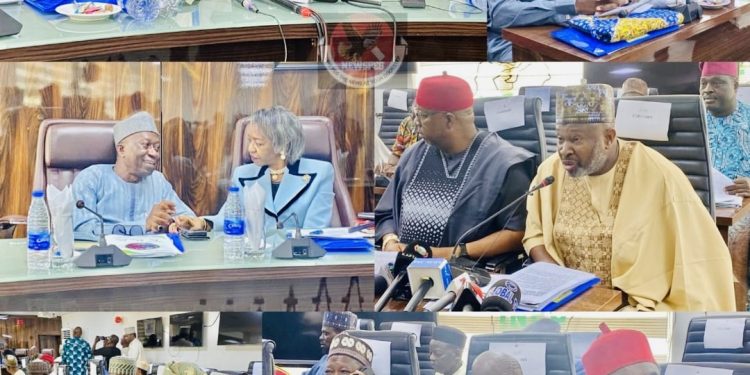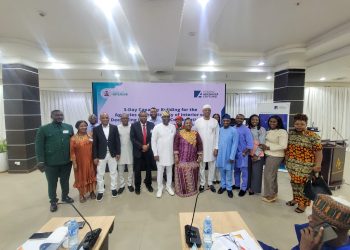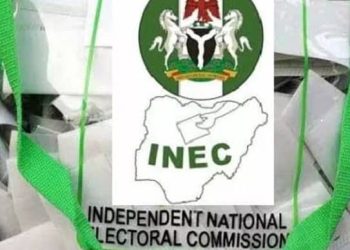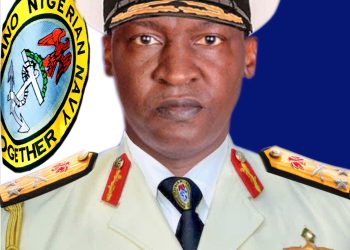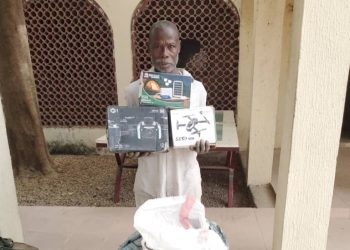…as commission moves to level Nigeria’s political playing field through media access reform and legal enforcement
By Nkechi Eze
The Independent National Electoral Commission (INEC) has entered into a strategic alliance with the Advertising Regulatory Council of Nigeria (ARCON) and the Inter-Party Advisory Council (IPAC) to confront what it describes as an entrenched pattern of political discrimination and unequal access to campaign advertising spaces particularly ahead of the forthcoming Anambra State Governorship election scheduled for November 8, 2025.
This development was made known on Thursday, June 26, during INEC’s second quarterly consultative meeting with political party leaders, held at the Commission’s headquarters in Abuja. The meeting was presided over by the INEC Chairman, Professor Mahmood Yakubu, who expressed strong disapproval over what he termed the growing abuse of incumbency and discriminatory access to public platforms and facilities.
Speaking candidly, Professor Yakubu warned that the Commission would no longer condone acts that violate the principles of free and fair electoral participation. “We have received credible reports of political parties particularly those in opposition being denied access to state-owned media houses, public buildings, and open spaces for rallies and advertisements. In many cases, we have also documented instances where exorbitant fees were charged for outdoor advertising, effectively pricing out candidates not aligned with the ruling party in certain states,” he stated.
“These actions are a violation of the Electoral Act 2022, which prohibits the use of incumbency to the advantage or disadvantage of any political party or candidate,” he continued. “We must all recognize that democratic competition thrives only when all parties and candidates are treated equitably.”
Professor Yakubu went on to announce that the Commission, in collaboration with ARCON and IPAC, would begin exploring legal options in cases where verifiable evidence of discrimination and rights violations exists. “The Commission will work with the Inter-Party Advisory Council (IPAC) and intensify our collaboration with the Advertising Regulatory Council of Nigeria (ARCON) for a possible legal action in the face of prima facie evidence of the violation of the law,” he said firmly.
The move comes at a critical juncture, with political campaigns for the Anambra Governorship election officially commencing just two weeks ago. The Commission had earlier published the final list of 16 candidates and their running mates, paving the way for intense political activity in the coming months.
In light of this, the INEC Chairman urged all political parties to familiarize themselves with the Commission’s guidelines on the conduct of meetings, rallies, and political processions. He reminded stakeholders that all political campaign activities must be conducted in accordance with the law and should uphold the principles of fairness, transparency, and peaceful engagement.
“We expect all parties to respect our regulations,” Yakubu said. “The use of media whether public or private as a weapon to suppress or sideline opposition voices is antithetical to democracy. We must foster a level playing field, not just in rhetoric, but in practice.”
The INEC Chairman further reiterated the Commission’s readiness to enforce the law where necessary and protect the integrity of the electoral space. “Let it be known that we will not tolerate any acts that undermine democratic competition. The public must be allowed to hear all voices and evaluate all candidates on a fair platform,” he emphasized.
The decision to address campaign-related inequities was received with visible relief and optimism by many party leaders in attendance, especially those representing opposition parties who have long lamented the lopsided nature of campaign coverage and access to public venues in some states.
A party chairman from one of the leading opposition blocs, who spoke anonymously after the meeting, said, “This is long overdue. We have faced situations where our candidates could not even put up a billboard because the state government’s allies controlled the advertising firms. In some areas, we couldn’t even book public venues for our rallies.”
Another party representative, also reacting to the announcement, noted that INEC’s willingness to take legal steps represented a “turning point in the fight for political equity.” He added, “If enforced properly, this collaboration with ARCON and IPAC can change the narrative and give smaller parties a fairer shot.”
ARCON is expected to play a vital role in enforcing advertising regulations and ensuring that political messages irrespective of the sponsoring party are not subjected to unfair barriers, censorship, or discriminatory pricing structures. IPAC, on its part, will continue to serve as the principal platform for inter-party dialogue and collective advocacy on issues affecting the electoral process.
With this new initiative, observers say Nigeria may be inching closer to entrenching a more transparent and equitable system for political communication, campaign publicity, and voter engagement, key pillars in the credibility of any democratic process.
As the 2025 Anambra election looms large, all eyes will be on how these new collaborative efforts translate into real-world improvements in political access and inclusivity across the nation’s electoral landscape.


